Gulf Oil Spill To Hit Atlantic in October
A group of oceanographers suggest that the oil from the Deepwater Horizon explosion will leave the Gulf in a few months. What happens then?
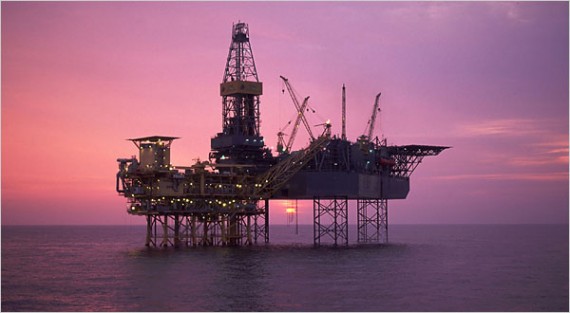
Wired reports that at least one oceangrapher’s models show oil from the Deepwater Horizon spill reaching the Atlantic coast by October.
Oil gushing from the Deepwater Horizon site in the Gulf of Mexico will reach the Atlantic Ocean within six months, says oceanographer Synte Peacock. Exactly when is all down to an eddy that broke off of the infamous Loop Current southwest of Florida on June 12.
Peacock, of the National Center for Atmospheric Research in Boulder, Colorado, usually studies how the ocean’s water absorbs atmospheric gases. But after the Deepwater Horizon platform exploded April 20, she realized her computer models could be used to follow where the oil gushing from the seafloor might end up.
[…]
Where the new eddy goes will strongly influence exactly where the oil ends up, she says. When it does reach the Atlantic, she notes, the oil will not necessarily wash ashore on beaches in a goopy mess. The oil might stay far out to sea, or be extremely diluted by the time it gets to the Atlantic.
Her team is now working on simulations of what will happen if the oil keeps gushing for months to come.
I’ve seen other models that actually show oil from the spill going ashore in ENGLAND, following the Atlantic currents, but I think there’s quite a bit of uncertainty in those. The methods behind the oil reaching the Atlantic, though, seem pretty sound.
I think that it’s difficult to grasp just how much we’re in uncharted territory here. Going by the latest estimate of 65,000 – 100,000 barrels of oil a day being spilled, we’re talking in the neighborhood of 4 to 6 million barrels of oil having been spilled in the Gulf so far. By way of comparison, the last Gulf spill back in the 1979 released about 3.5 million barrels–but that was over the course of nine months, and the coastal areas impacted were much less than what’s impacted here.
Assuming that the relief well is completed on schedule and succeeds in stopping the spill, this will still probably be larger than the oil spill in the Persian Gulf during the Gulf War–which the area still has not recovered from.
And on top of the oil spilled is the methane spilled, which appears to be exacerbating and enlarging the dead zones in the Gulf, the expansion of which could have even longer-lasting ecological impacts. (Apparently the rupture in the sea bed near the explosion site also has the potential to cause some low-probability–but very high impact–disasters as well.)
If the relief well fails, what happens then? We don’t know, because then we’ll be looking at the biggest oil spill in history with no way to cap it in sight, stuck in the middle of an economically important, ecologically delicate part of the ocean.
If the spill continues and does make its way to the Atlantic, you can probably kiss the majority of Florida’s $60 billion/year tourism industry goodbye–not to mention the tourism in other Gulf coastal areas. The fishing industry in the Gulf is probably going to be devastated for years to come, which doesn’t just impact the fishers there, but also impacts restaurants that sell seafood all over the country — the price of shrimp and crabs has already jumped around 40% in the last two months.
Most of the energy on the spill right now is focused on stopping it and minimizing the damage, which is good. But in many ways, the damage is already done, and there seems to be very little focus on what to do about that. The $20 billion escrow fund is likely to be a pittance compared to the real economic damages in the area.
The American economy is already weak–what happens when the numbers start coming in and people see the impact to fishing, tourism, net manufacturers, boat manufacturers, etc.? I don’t know, but I hope the folks in charge–both in government and in industry–are planning for it.

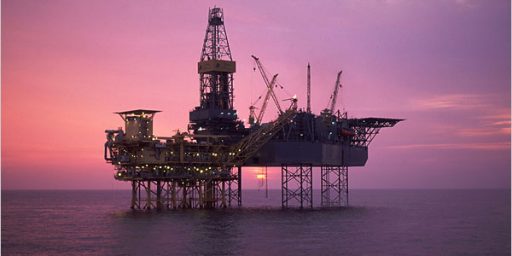

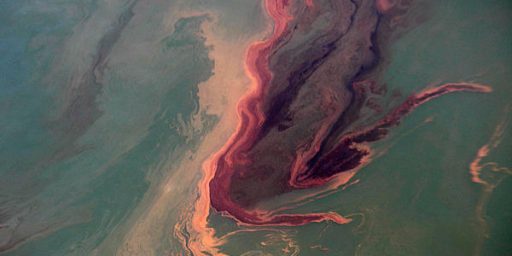
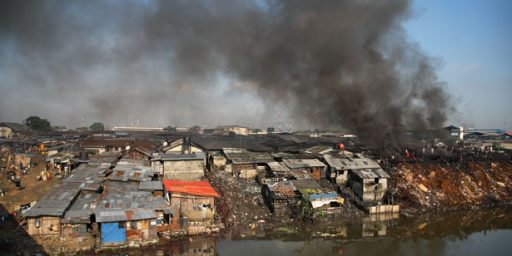
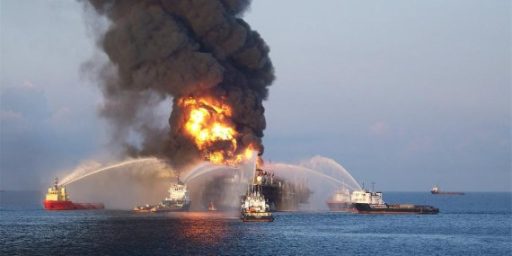
Yep. The damn environmentalists have never been right about anything.
For the pessimists in the crowd, here is an analysis from a commenter at The Oil Drum which is a pretty horrendous worst case scenario. Long article but worth the time to read. Any geology and engineering experts want to offer their opinions?
I wonder how hurricane season is going to impact on the disaster zone?
As for Alex’s post, this will be a very good way to validate the accuracy of the computer model but we can probably safely assume that the model will continue to be used regardless of whether it accurately predicts the timing and location and direction of the oil flow into the Atlantic. External validation of environmental computer models doesn’t make them or break them. That would be gauche.
When will we ever learn from our past mistakes we are only concerned in the all mighty dollar,its about time to go back to basics and abide in Gods laws and commandments.
Whats happened now cant be fixed ever ,.
How much more can this beautiful earth take,eventually like everyting else it gives up ?,then what.
Terry
This is a huge disaster no doubt about it, but it is still localized in relation to the whole earth. As the computer model predicts, oil will be in the Atlantic but it will be diluted. Nasty? Yes, but it won’t kill the whole earth and natural processes will continue. The gulf will clean up eventually. The earth won’t give up now any more than it “gave up” during the Deccan eruptions. Of course recovery is all in the long run, and as (I think) Keynes said, “In the long run we’re all dead.”
Mr. Prosser –
The models show that the oil might be diluted, and it’s currently being reworked to account for (a) the higher estimate and (b) the fact that it hasn’t stopped yet.
Right now the Gulf Spill is the 3rd biggest in human history, and even if the relief well stops it in August it will possibly become the the second biggest. However, the combination of the methane and the oil appears to be (as far as I can tell) without precedent, the the area impacted is both particularly environmentally sensitive and substantially economically important.
I don’t know what the long-term impacts are going to be, and I’m not sure anyone else does, either.
Again, I’m not denying the fact this is a huge disaster (see link) but it’s not earth-ending.
http://blogs.discovermagazine.com/badastronomy/2010/06/22/damn/
Mr. Prosser — By your logic, the US should have ignored the 9/11 attacks because they didn’t destroy the whole earth. In fact, they didn’t even destroy the whole country.
***Mr. Prosser — By your logic, the US should have ignored the 9/11 attacks because they didn’t destroy the whole earth. In fact, they didn’t even destroy the whole country.*** no by his logic he remembered to ad common sense, grrrr……….
But by your logic we should put death all of those who dare to even think about pan frying some chicken…..